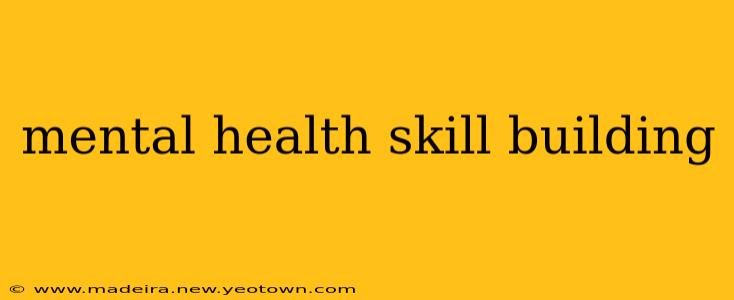Life throws curveballs. Sometimes, those curveballs leave us feeling bruised and battered, questioning our resilience. But what if I told you that you possess an inner strength, a mental fortress, that you can actively build and fortify? This isn’t about becoming superhuman; it's about equipping yourself with practical skills to navigate life's challenges with greater ease and grace. This journey of mental health skill-building is a personal one, and it begins with understanding your own unique needs and strengths.
What are Mental Health Skills?
Before we delve into specific skills, let's define what we mean. Mental health skills are the tools and techniques you can learn and practice to improve your emotional well-being, manage stress, and build resilience. Think of them as your personal toolkit for navigating the ups and downs of life. These skills aren't innate; they're developed through conscious effort and practice, much like learning a new language or a musical instrument.
Identifying Your Mental Health Needs: Where Do You Need to Strengthen Your Fortress?
This is a crucial first step. Reflect on your experiences. What situations tend to trigger negative emotions? Where do you feel most vulnerable? Honesty with yourself is key. Are you struggling with anxiety, managing stress effectively, or building healthy relationships? Pinpointing your areas of weakness allows you to focus your energy on developing the most relevant skills.
How Can I Improve My Mental Wellbeing? (A Common Question)
Improving mental well-being is a holistic process, not a quick fix. It involves a multifaceted approach:
- Mindfulness and Meditation: These practices help you become more aware of your thoughts and feelings without judgment. Regular practice can reduce stress, improve focus, and enhance self-awareness.
- Physical Activity: Exercise is a powerful mood booster. It releases endorphins, which have mood-lifting effects. Find an activity you enjoy, whether it's running, yoga, swimming, or dancing.
- Healthy Diet: Nourishing your body with wholesome foods provides the fuel your brain needs to function optimally. Limit processed foods, sugary drinks, and excessive caffeine.
- Sufficient Sleep: Aim for 7-9 hours of quality sleep per night. Sleep deprivation can exacerbate existing mental health challenges.
- Strong Social Connections: Meaningful relationships provide support and a sense of belonging. Nurture your connections with loved ones.
What are Some Practical Mental Health Skills I Can Learn?
Let’s delve into some specific, practical skills:
1. Stress Management Techniques:
Learning to manage stress is paramount. Techniques like deep breathing exercises, progressive muscle relaxation, and guided imagery can help you calm your nervous system in stressful situations. Consider incorporating these into your daily routine.
2. Problem-Solving Skills:
Developing strong problem-solving skills empowers you to tackle challenges effectively. Break down large problems into smaller, manageable steps. This helps prevent feeling overwhelmed and fosters a sense of accomplishment.
3. Emotional Regulation:
Understanding and managing your emotions is crucial. Learn to identify your emotions, acknowledge them without judgment, and develop healthy coping mechanisms, such as journaling or talking to a trusted friend.
4. Assertiveness Training:
Assertiveness is about expressing your needs and opinions respectfully, while setting healthy boundaries. It's about finding a balance between being passive and aggressive. Assertiveness training can help you navigate difficult conversations and relationships more effectively.
5. Cognitive Restructuring:
This involves challenging negative or unhelpful thought patterns and replacing them with more positive and realistic ones. This is a powerful tool for overcoming anxiety and depression.
What are the Best Apps for Mental Health?
Many apps offer guided meditations, mindfulness exercises, and tools for tracking mood and progress. Research different apps to find one that suits your preferences and needs. Remember that apps are supplementary tools; they shouldn't replace professional help if needed.
When Should I Seek Professional Help?
Building your mental fortress is a journey, not a destination. If you're struggling to manage your mental health, seeking professional help is a sign of strength, not weakness. A therapist or counselor can provide personalized guidance and support tailored to your specific needs. Don't hesitate to reach out if you're feeling overwhelmed or struggling to cope.
This journey of mental health skill-building is a marathon, not a sprint. Be patient with yourself, celebrate your progress, and remember that building a strong mental fortress is an ongoing process that will significantly enrich your life. You deserve to feel strong, resilient, and empowered.

